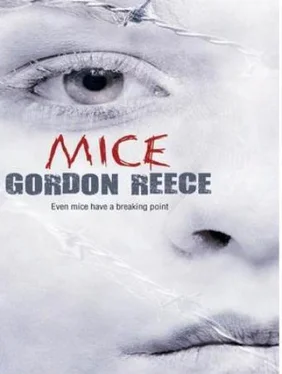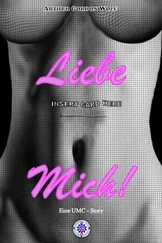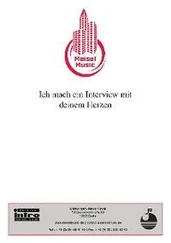When Mum came into the kitchen thirty-five minutes later, her face was more drawn, more haggard than I’d ever seen it before.
She emptied one of her dressing-gown pockets onto the breakfast bench. There was a flattened packet of cigarettes, a Zippo lighter, a worn leather wallet, sweet wrappers, a bunch of car keys with a football keyring and the mobile phone.
‘I’ve turned it off,’ she said.
She delved into the other pocket and waved a wad of crumpled notes at me. ‘And look at this! He had all the money from under my mattress in his back pocket — nearly two hundred pounds! I can’t believe I didn’t look in his pockets before we. .’ Her voice trailed off.
‘We’ve had hardly any sleep, Mum. We’re not thinking clearly.’
‘Well, we’ve got to start thinking clearly from now on — or we will get caught.’ She put her hands on her hips and chewed her bottom lip as she always did when she was agitated. ‘We’ve got to think. We’ve got to think .’
She was trying to suppress her panic, her horror and revulsion; she was trying to deal with this bloodbath as she would a problem tossed onto her desk at work — as a mental puzzle, an intellectual challenge. All she had to do was bring the full force of her brilliant mind to bear on it, her common sense, her methodical attention to detail, and she would solve it like she solved all the other problems.
It was only then that Mum looked around the kitchen and noticed the work I’d done. I’d picked up all the pieces of broken crockery and put them in a cardboard box by the back door. I’d set about cleaning up the worst of the blood with the mop, filling and emptying bucket after bucket of water at the sink, watching the water I poured away gradually change from dark crimson to the faintest of pinks. I’d dried the floor off as best I could with the tea towels that were to hand and was just about to start on the bloodstains on the walls and benchtops when Mum had come back.
‘Well done, Shelley,’ she smiled. ‘You’ve got rid of the worst of it.’ She glanced at the clock on the cooker. ‘Seven twenty-three. That’s good. We’re doing well for time.’
Then her face became concentrated again. The problem. She had to address the problem.
She took a thick roll of black bin bags out of the drawer under the sink and snapped one off.
‘Listen to me carefully, Shelley,’ she said. ‘We’ve got to get rid of everything that’s bloodstained and everything that can prove the burglar was ever in this house. We’ll put it all in bin bags and we’ll hide them upstairs in the spare room until we can get rid of them safely.’
She swept the burglar’s little pile of personal possessions into the bin bag, then picked up the box of bloodstained crockery and tried to fit that in. I held the neck of the bag open for her to make it easier, then brought over the tea towels I’d used to dry the floor and dropped them into the bin bag too.
‘Where’s the knife?’ she asked.
I took it from the draining board where I’d left it and gave it to her, trying not to look at the gore dried thick and dark like treacle on the blade. She wedged it deep inside the cardboard box.
She looked around her for other bloodstained objects, and noticed the doormat. She knelt down and folded this too into the bin bag. I mopped up the pink rectangular stain it had left behind.
Mum tore off another bin bag. She took off her blood-flecked dressing gown and stuffed it inside.
‘Where’s your dressing gown, Shelley?’
I had to think for a minute and then I remembered. I’d left it by the rose bed.
‘Can you run and get it, please, darling, and it can go in here with mine. It’ll have to be destroyed, I’m afraid — we can’t risk washing it.’
I didn’t want to go anywhere near the burglar’s grave, but I couldn’t say no — not after what Mum had just forced herself to do. I raced across the lawn, trying not to look at the oval rose bed, trying not to think about a voice coming from under the soil ( Fancy a snog? ) or a cold hand seizing my ankle. I grabbed the towelling bundle and sprinted back to the house as fast as I could.
Mum put my dressing gown in the bin bag with hers.
‘Now give me your wellies,’ she said, and that word, with its aura of childhood innocence, sounded weirdly out of place in that kitchen, at that moment.
I sat on a chair and tugged them off. Mum took hers off too, and flung both pairs into yet another bin bag.
‘OK,’ she said wiping her forehead with the back of her hand. ‘I’m going to really scrub everything in here — cupboards, walls, everything .’
She disappeared into the louvred kitchen cupboard where we kept all the household cleaning stuff, and emerged a few moments later with a plastic bowl, scrubbing brushes, a pile of clean tea towels and an enormous bottle of disinfectant. I looked at her in her nightie and bright yellow rubber gloves, her hair a ragged bird’s nest, and felt the urge to burst out laughing again as I had when the burglar’s trainer had come off in her hand and she’d been catapulted backwards.
‘People in the audience sometimes laugh out loud during the grisliest scenes in Macbeth ,’ Roger had said to me once.
‘Why?’ I’d asked.
‘Because horrible things are funny.’
I managed to beat down the urge to laugh — which was probably a good thing in light of the desperate resolve on Mum’s face.
‘What do you want me to do, Mum?’
She didn’t answer me. She was filling the bowl with hot water, absorbed in the details of the problem — how to rewind time, how to make the house look just as it had before the burglar broke in, how to clean the kitchen so that the police wouldn’t find a single spot of blood. I had to ask again.
‘I think you’d best go upstairs and shower and get all that blood off you,’ she said, as she yanked off another bin bag. ‘Put your nightie in here when you take it off and any towels that you use. Even if they don’t look bloodstained, they will be. . and we can’t afford to take any chances.’
For the second time in my life I looked at my reflection and was unable to recognize myself. The face of a savage stared out at me from the bathroom mirror — not a sixteen-year-old middle-class English girl, but a primitive savage with a face daubed in the blood of the kill, eyes wide with the excitement of battle, hair stiff with dried blood and sticking up in jagged stipples. It was a shocking sight and it took several seconds before I could accept that the savage in the mirror was me .
I rubbed my cheek with my index finger and the dried blood flaked off like rust, leaving a trail of russet powder on the white ceramic of the sink. I examined the grey smudges on my throat, two dark half-moons on either side of my windpipe, where the burglar had tried to strangle me. My throat still stung and I could feel something odd, something lumpy, every time I swallowed. My eyes were completely bloodshot save for a few microscopic blobs of white floating here and there. I remembered reading that the police could tell if a person had been strangled by the burst blood vessels in their eyes. Something to do with lack of oxygen in the blood. How close had I come to death? My head throbbed, and I felt so tired I could have curled up on the bathroom floor and gone to sleep right then and there.
A huge wave of depression crashed over me and swept me away. What a mess! What a disaster! And it was all my fault. I’d turned an unpleasant but commonplace domestic burglary into a disaster of monumental proportions, a calamity so shocking, so sensational it would be blazoned across the front pages in banner headlines.
Читать дальше












